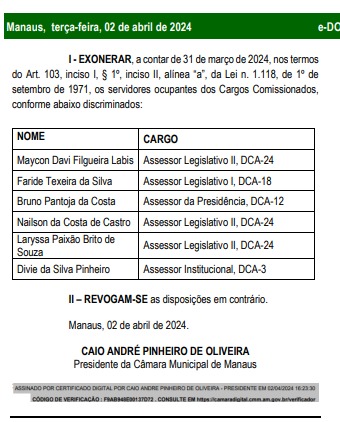Ghost employees are hired at CMM
[ad_1]
Manaus (AM) — The first lady of the municipality of Autazes (113 kilometers away from Manaus), in Amazonas, Divie da Silva Pinheiro, was accused of being on the list of “ghost employees” of the Manaus City Council (CMM) during the administration of the president of the house, councilor Caio André. After the allegations became public, the first lady, who was on the House’s payroll as a commissioned employee, was dismissed this Tuesday (2).
On February 14, 2023, Divie was appointed as “DCA-20 Institutional Advisor” by the president of the CMM, councilor Caio André, being dismissed in December of the same year. In January 2024, the first lady was appointed again by the councilor and acting president, councilor Everton Assis, to the position of “Institutional Advisor, DCA-3”.
According to data, during the period it was commissioned, Divie had gross income of R$271,101.03 in 14 months. On social media, what draws attention is that the commissioner published photos on her social media with her location in Autazes, during the same period in which she was supposed to provide services to CMM.


On Tuesday (2), the CMM published Divie’s dismissal in the Official Electronic Gazette (DOE) of the Legislative House, with the signature of Caio André, which starts from March 31, 2024.

Campaign Donors
Journalist Alex Braga recently revealed that Caio André gave positions at CMM to campaign financiers after being elected in the last election.
Highlighted on the Superior Electoral Court (TSE) website, two people appear prominently in the publication of candidacies and electoral accounts.
With a list of 11 names on Caio André’s official list, donations for two people exceed the value of R$19 thousand. According to the journalist’s findings, the president of the CMM did not answer whether the criteria for hiring donors constitute retribution.

In response to questions, councilor Caio André’s advisor informed the In timethat the mentioned civil servant, Divie da Silva Pinheiro, carried out administrative activities in the Presidency of the Legislative House and highlighted the information about her dismissal from the position.
Note
“It is worth noting that the aforementioned civil servant carried out her administrative activities in the Presidency of the Legislative House, and not in the office of councilor Caio André. It is worth noting that the number of employees assigned to parliamentary offices and the Presidency of the House differs, as they have different functions.
The CMM also clarifies that, as published in the Official Electronic Gazette last Tuesday (02/04), the employee was dismissed from the position of DCA-3 Institutional Advisor and is not part of the staff of the Manaus City Council. ”
Ghost employee in legislation
Misconduct, which can generate penalties in both political and administrative spheres, if confirmed, can result in fines and loss of office.
Despite being a frequently used expression, there is no specific classification for “ghost employee” in the Penal Code or Brazilian legislation. Lawyer Fernandes Neto points out that the conduct “is consistent with the crime of corruption, where public money is misappropriated”. “The punishment, after conviction, for the crime is detention, fines and suspension of political rights”, he adds.
Loss of parliamentary mandate
One of the most serious penalties for conduct is the loss of political office. Punishment can occur both in the political sphere — if disciplinary proceedings are opened against the parliamentarian in the Legislative House — or through civil means — with the investigation for administrative improbity.
The professor of Criminal Law at the Federal University of Ceará (UFC), Daniel Maia, details that a conviction for administrative improbity can also result in “payment of a fine, refund of salary and ban from holding public office”.
The revocation of the mandate is also a risk if the parliamentarian’s conduct is classified as a breach of parliamentary decorum, which would lead to proceedings before the Ethics Council. In this case, the penalties may be a warning or censure; temporary suspension of the exercise of the mandate for up to 30 days; or loss of mandate.
*With information from Diário do Nordeste
read more:
Caio André defends the end of the isolation of Amazonas
Caio André’s project that creates IPTU booklet in Braille advances at CMM
Caio André assumes presidency of Podemos in Manaus
[ad_2]
Source link








